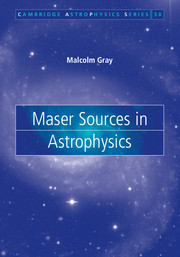Book contents
- Frontmatter
- Contents
- Preface
- 1 Introduction
- 2 Discovery
- 3 Basic theory
- 4 Observations of masers
- 5 Maser molecules
- 6 Environments of masers
- 7 Advanced theory
- 8 Computer modelling
- 9 Masers as diagnostics
- 10 Future prospects
- Appendix A Boltzmann's formula
- Appendix B Vector identities
- Appendix C Dirac delta-function
- Appendix D Change of variables in integration
- Appendix E Coordinate systems
- Appendix F Lagrange inversion theorem
- Appendix G Local standard of rest
- Appendix H Stochastic processes
- Appendix I Fourier transforms
- Appendix J Matrices
- Appendix K The centre of mass frame
- Appendix L Quantum-mechanical operators
- References
- Index
3 - Basic theory
Published online by Cambridge University Press: 05 May 2012
- Frontmatter
- Contents
- Preface
- 1 Introduction
- 2 Discovery
- 3 Basic theory
- 4 Observations of masers
- 5 Maser molecules
- 6 Environments of masers
- 7 Advanced theory
- 8 Computer modelling
- 9 Masers as diagnostics
- 10 Future prospects
- Appendix A Boltzmann's formula
- Appendix B Vector identities
- Appendix C Dirac delta-function
- Appendix D Change of variables in integration
- Appendix E Coordinate systems
- Appendix F Lagrange inversion theorem
- Appendix G Local standard of rest
- Appendix H Stochastic processes
- Appendix I Fourier transforms
- Appendix J Matrices
- Appendix K The centre of mass frame
- Appendix L Quantum-mechanical operators
- References
- Index
Summary
The theory of astrophysical masers can be neatly divided into two problems. One is the transfer of radiation through the medium containing the active (maser generating) molecules, and the other is the molecular physics required to calculate the inversion. Most of the complexity of maser theory arises because these problems are coupled. The molecular physics problem appears to be local: we calculate a population inversion at a position in space, which depends on the physical conditions at that point. Unfortunately, these conditions include the radiation field, which requires a solution to the obviously non-local problem of radiation transfer. In turn, radiation transfer requires a knowledge of the populations of the molecular energy levels at all points along a ray and, therefore, of a solution of the molecular physics problem along the path of the same ray.
Non-LTE physics
For gases which are not in local thermal equilibrium (LTE), we must calculate the populations of energy levels by means other than Boltzmann's formula. We do, however, assume that there are sufficient collisions to maintain a Maxwell–Boltzmann distrubution of molecular speeds. For the moment, we also assume that the molecular populations can be accurately calculated from a set of kinetic master equations – often called ‘rate equations’. These equations simply state that, in a steady state, the net population flow into any energy level from all the others is zero.
Information
- Type
- Chapter
- Information
- Maser Sources in Astrophysics , pp. 76 - 112Publisher: Cambridge University PressPrint publication year: 2012
